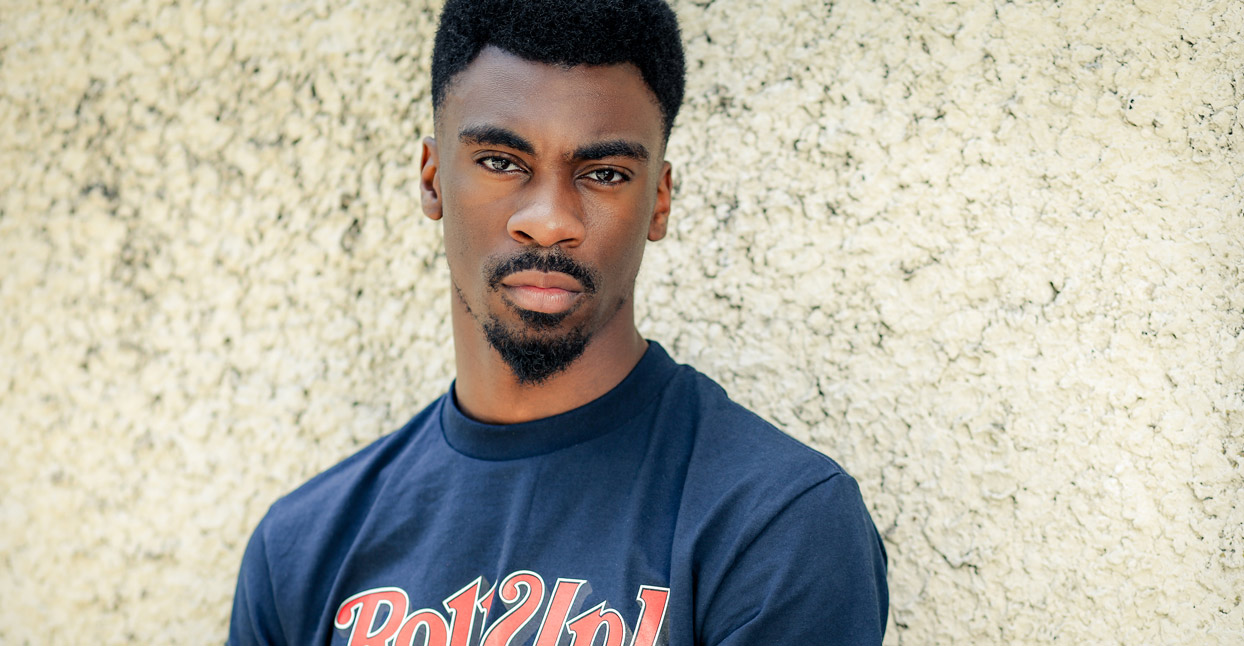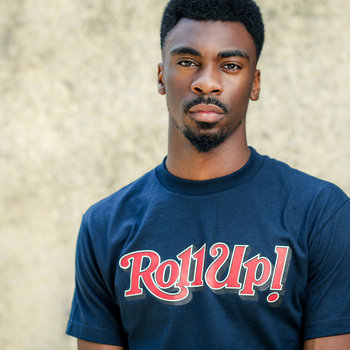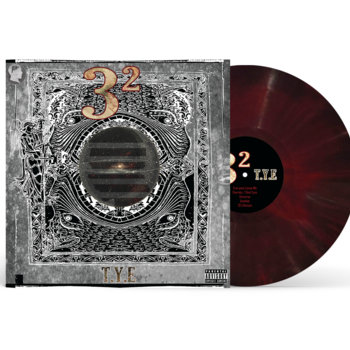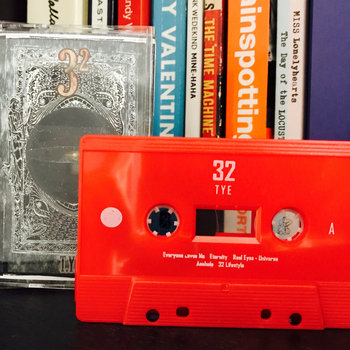
Far too often in music, an artist’s backstory is more interesting than the music itself. Yet for Dallas, Texas rapper T.Y.E, it’s impossible to separate the story from the man and the art.
After leaving his beloved Oak Cliff neighborhood for an operatic scholarship from Abilene Christian University, his lifetime struggle with depression and undiagnosed bipolar disorder culminated in a suicide attempt and a stint in a mental hospital. After T.Y.E left the hospital, he was officially diagnosed with bipolar disorder and has since channeled his daily struggle with his mental illness into an incredibly affecting form of rap music.
His debut album, 32, which takes its name from his hometown area code, 75232, is a revelatory mix of booming hood-rap, pensive introspection, and a few bursts of “I’m a way better rapper than you” braggadocio. The album is tethered to T.Y.E’s headspace—his fears and ambition, his depression and joy. While the rapper doesn’t let his disease define him, he uses his platform to help spread awareness and a culture of acceptance around mental illness. He’s got the shit-talking street menace of the South, the auto-tuned sex raps of our borderless modernity, and the self-aware wordplay of L.A.’s whip-smart art-rap cohorts.
T.Y.E’s depression never goes away, but some days are better than others. He’s always in the studio, the only place besides “the 32” where he really feels at home. We spoke with T.Y.E over the phone from his home in Dallas to discuss his deal with writer Jeff Weiss’s POW Recordings, getting nervous before shows, and how Beach Boy Brian Wilson affects his music.


Vinyl LP, Cassette


You had your album release show a few weeks back. Do you get nervous going on stage?
All the time. I was nervous this time for real. I was following Big Tuck, he’s like a Dallas legend. I was a tad bit nervous, but it went okay.
How does your neighborhood seep its way into your music?
My zip code, my hood’s gotten behind me. Naming the record 32, the impact is huge. Everyone has gotten behind me on that side of the city. They’re very proud of me. I went to the YG picnic the other day—that’s the local gang in Oak Cliff—and it was nothing but love out there. People that had never met me before, or people that had met me earlier in my childhood, they were all really getting behind me and really supporting me.
Were you anticipating the sort of reaction this album has received?
I really didn’t know what to expect. Jeff [Weiss, POW Recordings owner] told me some things were gonna happen, but I was still very modest about the whole situation. In previous interviews, I told people I didn’t know who Jeff Weiss was, more and more he’s been proven to be, ‘I am Jeff,’ you know what I’m saying? I really wasn’t prepared for all the dope-ass write-ups I’ve been getting from The Fader, HotNewHipHop, Vinyl Me, Please—it’s been a ride.
Now that the record’s been out for a little while, have you reflected on it at all?
As far as creativity and having listened to the album over and over and over again, I’ve moved on. I’ve moved on to two new projects. I always have—even before the POW signing. I’m still embracing everybody perceiving it and listening to it. I’m embracing all the good feedback I’m getting.

Vinyl LP, Cassette


One thing I love about the record is how quickly it often shifts from beautiful melodies to hyper-expressive rapping. Where did this style come from?
It’s a little bit of my mindset, the depression I go to and the way my mind ties to play tricks on me. I just had to dig deep, find those thoughts, and express them on the album the best way I know how.
Struggling with anxiety and depression, have your days gotten easier now that your album is out and doing well?
It’s a daily battle. Just this morning I had a little bit of a thing. But at the same time, when I get around friends, it makes it better. It’s definitely a daily battle. I still deal with it, I still have to do my meditations, I have to keep continuing with my day.
Your dad produced records. Does his career inspire your music creatively or in terms of work ethic?
Me being in the studio all the time and seeing how people acted really helped. I’ve always been comfortable in the studio and uncomfortable outside of the studio. It just feels like home to me.
Are you always making new music?
I’m always in the studio, always making new music. I wake up, I get on my piano, I listen to the song I did the night before, I make new beats, I continuously write. I never stop writing. Being in the studio is just a part of my life. Most of the times that I’m depressed—when I’m really going through it—I haven’t been in the studio. It’s almost like a crack addiction. If I’m not in the studio or I’m in a new city and I haven’t had the chance to get into somebody’s studio, I start itching.
Do you find it challenging to create while depressed? Or does it help you find a better headspace?
Sometimes my depression gets a little overwhelming and I can’t do anything—I can’t do nothing but sit there and let my thoughts manifest. The studio makes it easier. Being around the speakers, being around the microphone, and being around the computers helps me out in feeling comfortable in my environment. But it’s kind of like, I don’t know if you know anything about the Beach Boys, but Brian Wilson wrote a song called ‘In My Room’ and basically, the studio is my room. He does all of his crying, does his science, tells his secrets to his room. And the studio is my room.
When you went to school for opera did you stop rapping?
I was still rapping. With the opera stuff, my voice teacher used to tell me I had a real musicality. That comes from being in the studio, that comes from rapping. Instrumentalists in a school band, they’re great with rhythmic stuff. Kids in the choir aren’t as good with rhythm because you’re so busy listening to your own voice and how beautiful it is. You can fuck up on the rhythmic shit. But rhythm is instilled in me because of the studio. That just helped amp up my opera stuff, because it comes from me rapping all the time.
With your music, your personal history, and your struggles being so intertwined, do you ever find it difficult separating Tyler the person from T.Y.E the rapper?
Yeah it’s very difficult. I am a rapper. It’s a big part of me. Music is a humongous part of me. What you hear in an interview, what you hear in the music, is what you get from me in real life. It might be misinterpreted sometimes, but the people around me, when they see who I really am and they really get to talk to me and know me, they go back and listen to the music and get a better understanding of me as a whole. But I’m not too far from what I say in the music. It’s just a more intimate connection with what I’m saying when you really know me.
Vinyl LP, Cassette


Do you worry about people knowing too much about you? You’re so open about your story.
It was definitely a worry at first. When the depression shit first got out in the city, I was worried. But once my family knew, once they took heed to it, I wasn’t worried about what anyone else had to say about it. This is who I am. It fucks me up when I’m trying to date and women are scared of me. That’s really the only thing that fucks me up. Other than that it’s all good. I have no problems letting everybody know who I am. At least I know who I am. A lot of people don’t know who they are.
How does your bipolar disorder manifest itself?
My triggers are my career, heartbreak, and traumatic events in my past.
I read that when you first went out to L.A. to meet with Jeff Weiss and POW Recordings, you were suspicious that they were actually interested. Why was that?
I wasn’t even popping in my own city. Just to take that leap of faith to pack up and go to L.A., then sign with some folks I didn’t know shit about had me a little anxious. I went into it knowing that regardless of what happens, I know my work ethic and I can make do with whatever cards I’m dealt. I was very confident in my work ethic, but less so in who I was in my own city for people to just be interested. I knew I needed an opportunity. And I didn’t know who the fuck Jeff was, I didn’t know who Archie [Bonkers, T.Y.E’s manager] was. ‘Fly to L.A. and we’re gonna meet ya.’ That was just something for me to do. It was a blessing, right? I had some partners out there I wanted to see but at the same time I knew I wanted something better for my career. I was supposed to go with a couple friends, but they didn’t show up. So I just ended up doing this deal with Jeff. I didn’t trust anyone. In the movies they say, ‘Don’t trust the white dude.’ [Laughs] I took heed to that, but I took a leap of faith and it all worked out.
The record starts with ‘Everyone Loves Me,’ a track that focuses on the trappings of success. As your popularity grows, are you even more wary of new relationships—both personal and professional?
That’s a fear of mine for sure, but that’s a risk I’m willing to take. At the very least, if I do become this big thing or I am a megastar, at least I know what people love me for. I won’t be guessing and shit. If they love me at least I know what they love about me.
So you have more records on deck?
I’m already in production on a few records. I’ve got one full of hood shit that I’m just making to try to put on some more artists in my city. It ain’t no fun if we all don’t get some. The next big one I want to drop is somewhere along the lines of 32, would be Incapable. It’s a record I’m working on and it’s a love story. That’s gonna dig deep on my encounters with women and how women deal while I have a mental disorder. It’s about how my mental illness plays a part in being in love.
Not a lot of people are comfortable talking about their mental issues. How long did it take you to find that level of comfort?
Twenty-two years [laughs].
What happened that led you to that place?
When I went to the mental hospital. My thought process has always been an insecurity of mine. My thought patterns have always made me feel a little bit like an outcast. My peers, they way they think, it’s different. When I was younger, I didn’t want to be myself. Being myself was a challenge, especially with my environment. Even after I did the opera thing, it was hard to express who I was—especially with my peers. Going to college made that even harder for me. It’s always been rough, so once I went to the mental hospital and after my family saw me without my mask—mask off—that was it. This is who I am, I hope you love me for who I am but this is how I think.
It must be pretty surreal to be living with this thing inside yourself for so long and then all of a sudden, it’s no longer a secret.
It’s not like I knew about what, exactly, it was. I was self-enlightened when I was 12 or 13. I would always doubt myself. I could have been a quarterback in middle school, but I doubted myself. Kids were like, ‘You’ve got the best arm! Why aren’t you quarterback?’ Well, it’s because I doubt myself. I would doubt myself and doubt myself and doubt myself. I couldn’t sleep at night. I would do my homework, but not go to class. I would just break out in tears in the classroom, and no one knew why. I’d have to make up some excuse, like my uncle died or something. It’s a chemical imbalance I’ve been dealing with forever. There were just so many things that would happen to me. Like when I’d have anxiety attacks in class, and there was nothing I could do about them. In school, people would be cheating off me—I was smart—but I’d be getting mediocre grades because I couldn’t go to class. I’d have anxiety attacks walking to my class.
You were talking about the story behind 32. What does the narrative arc of this record look like to you?
It’s a story about love. It’s a story about untouched, untainted love, and my striving for it. It’s about what I go through to try to get that. Not in the sense of being in a relationship, but all kinds of love: spiritual love, self-love, a little bit of relationship love in there too, family love, all kinds of love. It’s about what happens when I get it, and what happens when I fuck up and it’s not the love I’m looking for. It’s just about love.
—Will Schube







